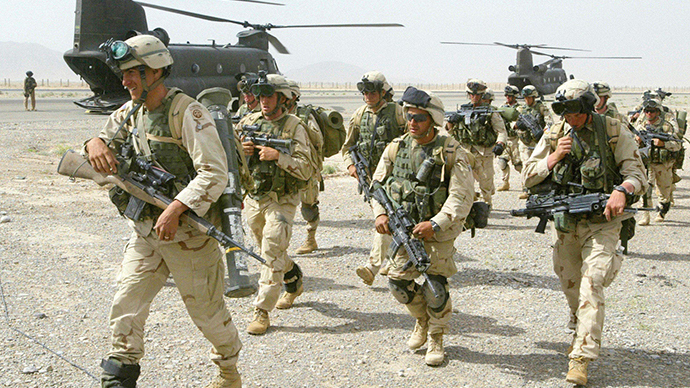Kabul Leans on Foreign Military Power in Absence of Internal Solution
Michael Hughes
June 19, 2016
Afghanistan’s oxymoronic divided “Unity” government is finding temporary succor in the U.S. and NATO expanding their military purview in the face of a Taliban movement on the march. President Barack Obama is worried about his legacy and does not want to see more Taliban gains on his watch, but his policy shift is unlikely to save the Afghan people, who will continue to suffer through stalemates on both the political and military fronts.
On Monday [June 13, 2016], Afghanistan’s Ambassador to the United States Hamdullah Mohib told Sputnik that his country looks favorably upon the Pentagon enlarging its commitment, which encompasses more airstrikes, accompanying Afghan conventional forces in the field and targeting the Taliban.
“This would enable the U.S. troops… to help Afghan troops in offensives against the Taliban,” Mohib explained.
Earlier in the week deputy presidential spokesman Sayed Zafar Hashimi struck a similar note and the Afghan Defense Ministry appeared of the same mind. Ministry spokesman Daulat Waziri told AFP that Afghanistan, “welcomes the U.S. announcement of broader involvement in the war.”
In addition, U.S. NATO allies are prepared to maintain a presence in Afghanistan and will commit billions through 2020 to support Afghan security forces. U.S. Defense Secretary Ash Carter reportedly even told NATO members that Washington will revisit Obama’s decision to withdraw American troops.
The policy change comes as Taliban fighters continue to gobble up more territory. According to the The Long War Journal, the insurgency now controls 39 districts in Afghanistan while contesting another 43. Increased external military support might be able to stem the Taliban tide but will be unable to remedy Afghanistan’s political crisis.
The dysfunctional U.S.-brokered Ghani-Abdullah government, for one, continues to suffer from a legitimacy crisis and appears incapable of implementing sorely needed electoral reforms. Tolo News reported on Wednesday [June 15, 2016] that some politicians and members of the Independent Election Commission (IEC) have sabotaged President Ghani’s efforts to enact legislation to pave the way for parliamentary elections.
“The commissioners launched massive campaigns and they get positive results. They deceived the lawmakers in the Wolesi Jirga by saying that if the elections are not held, you remain in your posts,” head of the Afghan parliament’s legal and judicial commission Mohammad Abdoh was quoted as saying.
Obama’s decision to widen the rules of engagement makes for a dangerous slippery slope, as U.S. forces seem destined to get bogged down in Afghanistan for perpetuity. University of Arizona History Professor David Gibbs told this writer last week that the most striking aspects of the conflict in Afghanistan include its very protracted nature and absence of any plausible termination point.
“The reason for the recent decision to escalate is obviously the political and military weakness of the US-supported Afghan government, which would not be able to survive on its own, combined with continued activity by Taliban and other insurgent forces, which show no sign of defeat,” Gibbs argued.
Moreover, Obama’s move comes in the wake of the United States knocking off the one Taliban leader that showed a scintilla of willingness to engage in peace talks, only to be replaced by a more committed jihadist, in a sign that the U.S. has zero faith in a political settlement. In fact, Al Qaeda leader Ayman al-Zawahri recently pledged allegiance to the new Taliban leader Haibatullah Akhundzada.
On the other hand, the U.S. State Department has applauded Kabul for striking a deal with the militant faction led by Gulbuddin Hekmatyar, a designated terrorist, Osama bin Laden crony, and one of the only government leaders to shell his own capital. Hence, Afghans have every right to look askance upon Washington’s idea of a political solution.
Words of wisdom have come from the unlikeliest of places with respect to the latest developments in the Afghan conflict, that source being former president Hamid Karzai, who casts doubt on U.S. military power as an appropriate remedy for Afghan ills.
“I don’t think military means will bring us [peace],” Karzai told The Washington Post in an interview published earlier this week. “We did it for the last 14 years and it didn’t bring us that, so how do we know…military action will bring us that now?”
Not to mention that with foreign military expansion typically comes more civilian casualties, as Karzai also underscored.
“We are not in a conventional war… there are no front lines here,” he said. “When there are no front lines the population becomes the front line.”
Karzai is able to provide a more sober objective analysis given he is no longer a central abettor of the political tumult that ails Kabul and, at the end of the day, he is right. A foreign military option is not the panacea to Afghanistan’s internal dysfunction – only a true political solution designed by and for Afghans can break the two-front stalemate.

